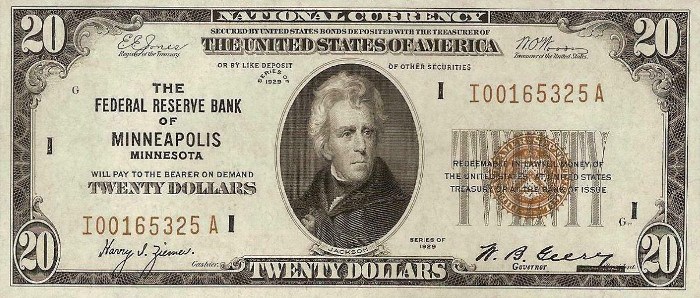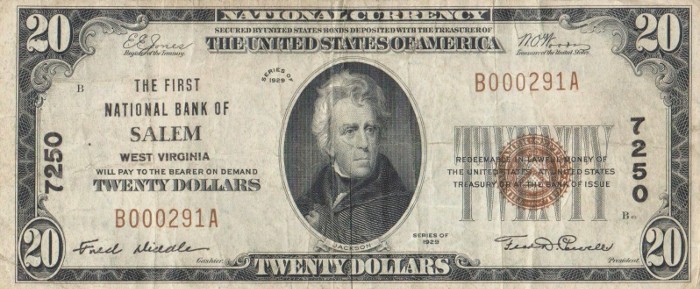There were two different types of 20 dollar bills issued in 1929. There were the Federal Reserve Bank Notes and also the National Bank Notes. The only difference is on the front of the bill where it states whether the bill is issued from a Federal Reserve Bank or a National Bank.
Federal Reserve Bank Notes

Value
Most 1929 series $20 Federal Reserve Bank Notes are worth around $70-80 in very fine condition. In extremely fine condition the value is around $75-110. In uncirculated condition the price is around $200-275 for bills with an MS 63 grade.
Bills issued from the Federal Reserve Banks of Dallas and San Francisco are more valuable. In addition, star notes will sell for higher prices.
National Bank Notes

There were two different types of 1929 series $20 National Bank Notes- Type 1 and Type 2. Both types look similar so you need to look closely. The only difference is that Type 2 bills have the bank charter number on the lower left and upper right of Jackson's portrait.
Value
The value will mainly depend on the type and the bill's condition.
The Type 1 bills are worth around $90 in very fine condition. In uncirculated condition the price is around $225 for bills with an MS 63 grade.
The Type 2 bills are worth around $95 in very fine condition. In uncirculated condition the price is around $250 for bills with an MS 63 grade.
Note: Valuable bills should be placed inside currency holders.
Grading System
Very fine- A note that has been in circulation but not for a long time. The note is still relatively crisp. There may be some creases, folds, or light smudges.
Extremely fine- A note that shows small signs of having been in circulation. The note will be bright and it will have almost all of its original crispness. There might be one or two minor creases or folds but there are no stains, discolorations, or tears.
MS 63 choice uncirculated- A note that shows no signs of ever having been in circulation. The note still has its original crispness. The note is also well-centered.
Sources:
A Guide Book of United States Paper Money
See also:
